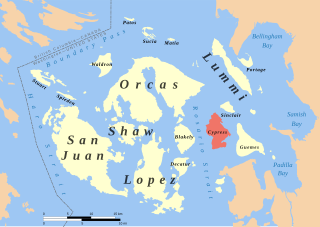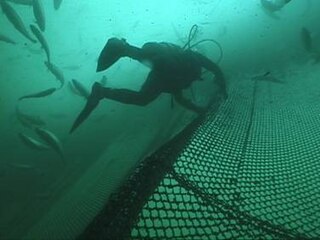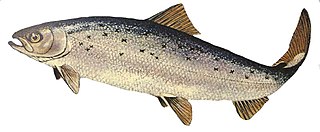Related Research Articles

Aquaculture, also known as aquafarming, is the controlled cultivation ("farming") of aquatic organisms such as fish, crustaceans, mollusks, algae and other organisms of value such as aquatic plants. Aquaculture involves cultivating freshwater, brackish water and saltwater populations under controlled or semi-natural conditions, and can be contrasted with commercial fishing, which is the harvesting of wild fish. Aquaculture is also a practice used for restoring and rehabilitating marine and freshwater ecosystems. Mariculture, commonly known as marine farming, is aquaculture in seawater habitats and lagoons, as opposed to freshwater aquaculture. Pisciculture is a type of aquaculture that consists of fish farming to obtain fish products as food.

Salmon is the common name for several commercially important species of euryhaline ray-finned fish from the genera Salmo and Oncorhynchus of the family Salmonidae, native to tributaries of the North Atlantic (Salmo) and North Pacific (Oncorhynchus) basins. Other closely related fish in the same family include trout, char, grayling, whitefish, lenok and taimen, all coldwater fish of the subarctic and cooler temperate regions with some sporadic endorheic populations in Central Asia.

Fish farming or pisciculture involves commercial breeding of fish, most often for food, in fish tanks or artificial enclosures such as fish ponds. It is a particular type of aquaculture, which is the controlled cultivation and harvesting of aquatic animals such as fish, crustaceans, molluscs and so on, in natural or pseudo-natural environments. A facility that releases juvenile fish into the wild for recreational fishing or to supplement a species' natural numbers is generally referred to as a fish hatchery. Worldwide, the most important fish species produced in fish farming are carp, catfish, salmon and tilapia.

The LummiNation is a federally-recognized tribe of primarily Lummi people. The Lummi Nation also includes some Nooksack, Samish, and other local tribes which were removed to the reservation. It is based in the coastal area of the Pacific Northwest region of Washington state in the United States, and is located within the Bellingham Metropolitan Area

The Atlantic salmon is a species of ray-finned fish in the family Salmonidae. It is the third largest of the Salmonidae, behind Siberian taimen and Pacific Chinook salmon, growing up to a meter in length. Atlantic salmon are found in the northern Atlantic Ocean and in rivers that flow into it. Most populations are anadromous, hatching in streams and rivers but moving out to sea as they grow where they mature, after which the adults seasonally move upstream again to spawn.

The Chinook salmon is the largest and most valuable species of Pacific salmon. Its common name is derived from the Chinookan peoples. Other vernacular names for the species include king salmon, Quinnat salmon, Tsumen, spring salmon, chrome hog, Blackmouth, and Tyee salmon. The scientific species name is based on the Russian common name chavycha (чавыча).

Cypress Island is the westernmost part of Skagit County, Washington, and is about halfway between the mainland and offshore San Juan County. It is separated from Blakely Island to the west by Rosario Strait and from Guemes Island to the east by Bellingham Channel. The island has a land area of 5,500 acres (22 km2), and a population of 40 persons as of the 2000 United States Census.

Genetic pollution is a term for uncontrolled gene flow into wild populations. It is defined as "the dispersal of contaminated altered genes from genetically engineered organisms to natural organisms, esp. by cross-pollination", but has come to be used in some broader ways. It is related to the population genetics concept of gene flow, and genetic rescue, which is genetic material intentionally introduced to increase the fitness of a population. It is called genetic pollution when it negatively impacts the fitness of a population, such as through outbreeding depression and the introduction of unwanted phenotypes which can lead to extinction.

The salmon louse is a species of copepod in the genus Lepeophtheirus. It is a sea louse, a parasite living mostly on salmon, particularly on Pacific and Atlantic salmon and sea trout, but is also sometimes found on the three-spined stickleback. It feeds on the mucus, skin and blood of the fish. Once detached, they can be blown by wind across the surface of the sea, like plankton. When they encounter a suitable marine fish host, they adhere themselves to the skin, fins, or gills of the fish, and feed on the mucus or skin. Sea lice only affect fish and are not harmful to humans.

The aquaculture of salmonids is the farming and harvesting of salmonid fish under controlled conditions for both commercial and recreational purposes. Salmonids, along with carp and tilapia, are the three most important fish groups in aquaculture. The most commonly commercially farmed salmonid is the Atlantic salmon.

China, with one-fifth of the world's population, accounts for two-thirds of the world's reported aquaculture production.

Copper alloys are important netting materials in aquaculture. Various other materials including nylon, polyester, polypropylene, polyethylene, plastic-coated welded wire, rubber, patented twine products, and galvanized steel are also used for netting in aquaculture fish enclosures around the world. All of these materials are selected for a variety of reasons, including design feasibility, material strength, cost, and corrosion resistance.

AquAdvantage salmon is a genetically engineered (GE) fish, a GE Atlantic salmon developed by AquaBounty Technologies in 1989. The typical growth hormone-regulating gene in the Atlantic salmon was replaced with the growth hormone-regulating gene from Pacific Chinook salmon, with a promoter sequence from ocean pout. This gene enables GM salmon to grow year-round instead of only during spring and summer.
Organic aquaculture is a holistic method for farming fish and other marine species in line with organic principles. The ideals of this practice established sustainable marine environments with consideration for naturally occurring ecosystems, use of pesticides, and the treatment of aquatic life. Managing aquaculture organically has become more popular since consumers are concerned about the harmful impacts of aquaculture on themselves and the environment.

Aquaculture is the farming of fish, shellfish or aquatic plants in either fresh or saltwater, or both. The farmed animals or plants are cared for under a controlled environment to ensure optimum growth, success and profit. When they have reached an appropriate size, they are harvested, processed, and shipped to markets to be sold. Aquaculture is practiced all over the world and is extremely popular in countries such as China, where population is high and fish is a staple part of their everyday diet.

Diseases and parasites in salmon, trout and other salmon-like fishes of the family Salmonidae are also found in other fish species. The life cycle of many salmonids is anadromous, so such fish are exposed to parasites in fresh water, brackish water and saline water.

Drew Christian MacEwen is an American politician of the Republican Party. He is a member of the Washington State Senate, representing the 35th district, which covers the entirety of Mason County and parts of Kitsap and Thurston counties.

J50 Scarlet was a juvenile female member of the endangered southern resident orca community in British Columbia and Washington state. She was born near South Pender Island, British Columbia around Christmas Day, 2014. In late June, 2018, Scarlet appeared emaciated and was feared near death. Another calf died in late July, 2018 leaving Scarlet "represent[ing] the future" of the declining Southern Residents, thought to number 75, cut off from their food supply of Puget Sound chinook salmon, themselves listed as a threatened species. Scarlet's mother, known as J16, was born in 1972.

Hilary S. Franz is an American politician and conservation attorney serving as the 16th Washington State Commissioner of Public Lands since 2017. She is a member of the Democratic Party who was previously a member of the Bainbridge Island city council and was elected as commissioner in 2016.

Aquaculture in the United Kingdom is dominated by salmon farming, then by mussel production with trout being the third most important enterprise. Aquaculture in the United Kingdom represents a significant business for the UK, producing over 200,000 tonnes of fish whilst earning over £700 million in 2012 (€793 million).
References
Citations
- ↑ Lee, Windrope & Murphy 2018.
- 1 2 3 Lee, Windrope & Murphy 2018, p. 6.
- ↑ Mapes 2018a.
- ↑ NPR.org 2017.
- 1 2 3 Mapes 2018c.
- 1 2 Lee, Windrope & Murphy 2018, p. 24.
- ↑ Lee, Windrope & Murphy 2018, p. 21.
- 1 2 3 Lee, Windrope & Murphy 2018, p. 86.
- ↑ Lee, Windrope & Murphy 2018, p. 36.
- ↑ Lee, Windrope & Murphy 2018, p. 76.
- 1 2 3 Lee, Windrope & Murphy 2018, p. 8.
- 1 2 3 Mapes & Bernton 2017.
- ↑ Lee, Windrope & Murphy 2018, pp. 6–7.
- ↑ Lee, Windrope & Murphy 2018, p. 52.
- 1 2 Rosenbaum 2018.
- ↑ Lee, Windrope & Murphy 2018, p. 99.
- ↑ Mapes 2018d.
- ↑ Mapes 2018b.
- ↑ "Starbucks + SIFF Proudly Present", Starbucks Channel, Starbucks Corp., June 4, 2018
- ↑ 2018 River & Ocean Film Festival, University of Washington College of the Environment/NOAA – Washington Sea Grant program, retrieved 2019-01-10
Bibliography
- Lee, Kessina; Windrope, Amy; Murphy, Kyle (Jan 2018). 2017 Cypress Island Atlantic Salmon Net Pen Failure: An Investigation and Review (PDF) (Report). Washington State Department of Natural Resources. pp. 1–120.
- Mapes, Lynda V.; Bernton, Hal (2017-08-22). "Please go fishing, Washington state says after farmed Atlantic salmon escape broken net". The Seattle Times. Retrieved 2018-05-05.
- Mapes, Lynda V. (30 January 2018a). "Fish farm caused Atlantic salmon spill near San Juans, then tried to hide how bad it was, state says". The Seattle Times. Retrieved 2018-05-05.
- Mapes, Lynda V. (2 March 2018b). "State kills Atlantic salmon farming in Washington". The Seattle Times . Retrieved 2018-05-05.
- Mapes, Lynda V. (13 April 2018c). "Restocking Atlantic salmon pens blocked by court". The Seattle Times. Retrieved 2018-05-05.
- Mapes, Lynda V. (19 April 2018d). "8 months after farmed-fish escape, lively Atlantic salmon caught 40 miles upriver". The Seattle Times. Retrieved 2018-05-05.
- "Why Are Atlantic Salmon Being Farmed In The Northwest?". NPR.org. 2017-08-29. Retrieved 2018-05-05.
- Rosenbaum, Cary (22 January 2018). "When Atlantic salmon escape in the Pacific, who cleans up? (Salmon on the lam)". High Country News . Retrieved 2018-05-05.